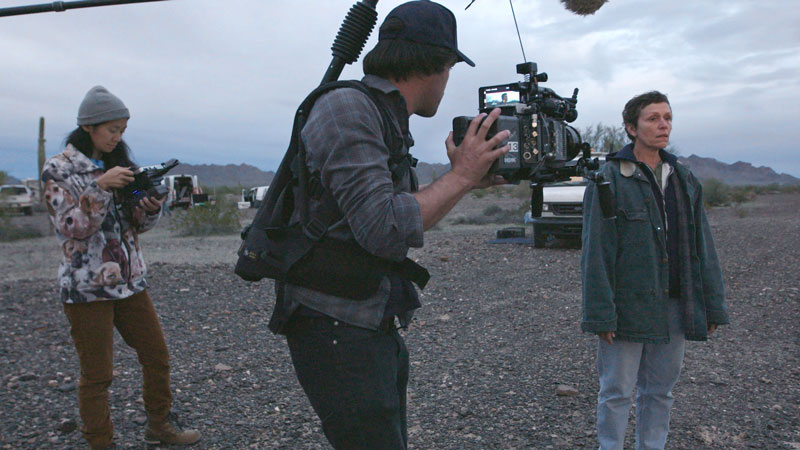
Early in this movie, Fern (the central character played by Frances McDormand) is in her van when she grabs a big white bucket, pulls down her pants, plants her butt on it, and proceeds to defecate. This scene defines the essential character of this movie—somewhat desperate circumstances, primitive conditions, and a simple, distinct, and honest acknowledgement of life’s basics. An instructor at a camp for nomadic campers counsels “You have to manage your sh*t!” something Fern clearly knows how to do!
That scene is representative of the curious contrasts of this film. On the one hand, there are beautiful twilight landscapes of some of the American West’s most iconic views. On the other hand, there is the stark reality of living out of vans and pickup campers, moving from one RV park to National Park campgrounds—not because of a fun road trip, but because they simply have no other place to go.
Maybe these nomads live a nearly idyllic life, free of the binds that property imposes. Or maybe they struggle with simple things like getting enough food. The rich beauty of the American Dream that western landscapes seem to promise contrasts with the harsh reality of how, for many, that dream is a slow-moving nightmare.
Chloe Zhao adapted this screenplay from the book of the same name by Jessica Bruder and earned an Oscar nomination, as well as for film editing. She also directed the film, garnering an Oscar win as Best Director. The Academy chose this film as this year’s Best Picture. (That gives Zhao four Oscar nominations and two wins for just this movie!) Ms. Zhao has a fascination with the American West, and a lean towards social realism—both traits found in Nomadland. Frances McDormand won the Best Leading Actress Oscar for her performance, which Brian Tallerico (RogerEbert.com) labels “one of the most subtle and refined of her career.” (There’s that word “subtle” again!). It’s as if her purpose in this movie is to let the stories of the real nomads bounce off her; her role is to draw out their stories.
This is where I start to have trouble with this film. I’m not sure Zhao had a plan. Did she simply allow everything to fall together? Was she directing it or just reacting to events around her?
McDormand and David Straithairn, who plays something of a romantically interested partner, are the only two real actors in the film. All the rest of the nomads are real “nomads”—people living out of their vans and campers and traveling around the campgrounds of the West. In fact, the documentary nature of this movie is so much a part of its fabric that the nomads never realized until near the end that McDormand was not truly one of them. Apparently they thought the film crew—living out of vans and campers just like McDormand—were there filming Fern as a documentary.
I feel there are some real issues around integrity. In my review of The Mole Agent, one of this year’s documentaries, I criticized the movie as filmed under false pretenses; they hired someone to play a role in interaction with nursing home residents. In my view, that was misleading the residents, manipulating their feelings, and then filming the results. How is that different from this situation? Frances McDormand is definitely not a nomad in real life, regardless of the fact that she lived that way and acted the role.
This lack of clarity finds its strongest expression in one of the key failures of this film. While it works in striking an empathetic response toward the nomads, it fails at being strong in exposing where the responsibility for their situation lies. At the beginning, the movie reveals that the closure of a mine in the company town of Empire, Nevada resulted in the closing, five months later, of the entire town. This event sent Fern, and others like her, out on the road—too poor to buy a home, and too old to find another job. US Gypsum essentially abandoned her after many years of her husband’s contribution to corporate wealth.
Similarly, Zhao presents the seasonal temp employer Amazon as more of a rescuer—a place to earn a few bucks when needed, instead of as an organization in a feeding frenzy on the nomads’ limited resources.
Because I own an RV, have spent time in both commercial, state, and national campgrounds, and have seen a lot of what we called “full-timers,” and because my wife and I are just one major life crisis from being nomads ourselves, I don’t think this movie is nearly strong enough. It fails to articulate the real reason these people are where they are. If its value as a movie is more of an exposé on an awful situation, then it doesn’t make it awful enough. This topic does not deserve subtlety. Simply put, this movie needs more anger. (3.5 stars)
Author
-

I am a retired software developer, who enjoys traveling and watching movies. I live with my wife, Joan, and our two Welsh Corgis, Fleur and Smooch. Although we lived in New Mexico for a couple of decades, we recently moved to Colorado to be closer to family. We own a small trailer and have a bucket list of more than 200 National Parks and Monuments to visit. We take long trips to see different parts of the country, stopping for a few days at each park or town that inspires us. (Our travels are documented on our website: MisterParksTravels.com ) Our most recent trip was a two-month exploration of Alaska, including a week north of the Arctic Circle. But we can’t travel all the time, so we love to watch movies together, we enjoy the movie and the conversation it generates and I began a serious practice of reviewing movies. I review Oscar-nominated am now published in three printed and online newspapers in both New and Old Mexico! The Questa del Rio News was the first to print my column and we will be forever grateful for the opportunity.
View all posts



